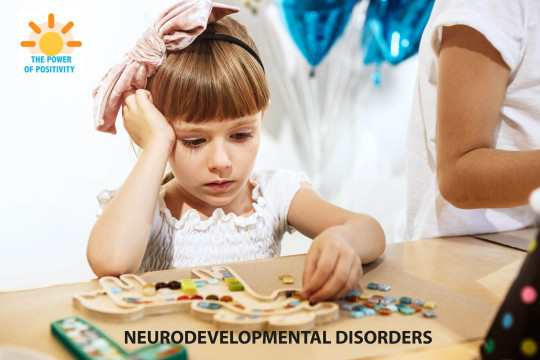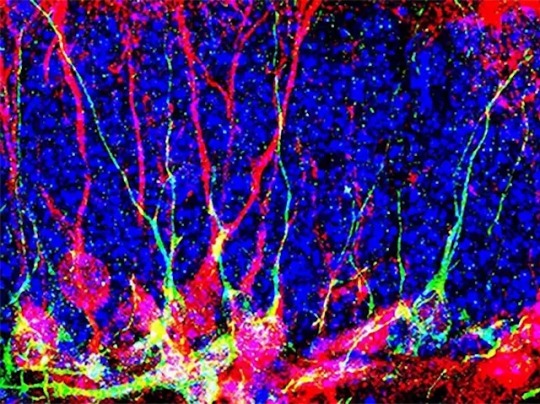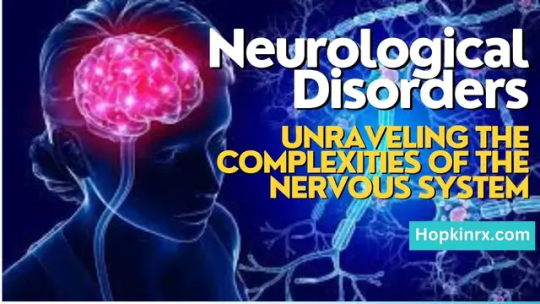#neurodegenerative diseases
Text
A spectrum of neurodegenerative diseases, including frontotemporal dementia (FTD), progressive supranuclear palsy (PSP), and corticobasal degeneration (CBD) are due to the accumulation of abnormal, misfolded tau proteins in the brain.
A team of researchers has found potential ways to interrupt this process by targeting “sticky” sites along the long form of mutated tau, preventing the misfolding and spreading of the neurofibrillary tangles.
Continue Reading.
61 notes
·
View notes
Text

Problems with Excitability
Details of the structure and functional changes that underlie neurons' impaired excitability characteristic of the neurodegenerative disease amyotrophic lateral sclerosis (motor neuron disease)
Read the published research article here
Image from work by Peter Harley and colleagues
Centre for Developmental Neurobiology, Kings College London, London, UK
Image originally published with a Creative Commons Attribution 4.0 International (CC BY 4.0)
Published in Cell Reports, November 2023
You can also follow BPoD on Instagram, Twitter and Facebook
#science#biomedicine#immunofluorescence#biology#neuroscience#neurodegenerative diseases#amyotrophic lateral sclerosis#Lou Gehrig disease#motor neurone disease#MND
13 notes
·
View notes
Text

3-week-old mice, synuclein knockouts. I had to make this photo, because that was the only way to count them.
#laboratory#science#neuroscience#neurodegenerative diseases#parkinson's disease#science side of tumblr
3 notes
·
View notes
Text
Loosing a parent to a neurodegenerative disorder feels like watching them die over months and years.
We're almost 7 years in at this point. I'm still shocked every time there is a noticeable loss of function. I should be used to it by now but I'm not.
I still get frustrated and angry. With the situation, not with them. But at the end it's my parent I lash out against.
I'm still so sad and lost. It's been almost a year in therapy, I found my ways to grieve now and have plans how to grieve after they're gone. But I still cry myself to sleep sometimes.
#neurodegenerative diseases#neurodegeneration#child of a dying parent#grief#loss#loss of a parent#chronic illness#terminal illness#therapy can only do so much i have to scream into the void
2 notes
·
View notes
Photo

Stanley B. Prusiner was born on May 28, 1942. An American neurologist and biochemist, he is the Director of the Institute for Neurodegenerative Diseases at University of California, San Francisco (UCSF). Prusiner won the Nobel Prize in Physiology or Medicine in 1997 for his work in proposing an explanation for the cause of bovine spongiform encephalopathy (”mad cow disease”) and its human equivalent, Creutzfeldt-Jakob disease. In this work, he coined the term prion, which comes from the words “proteinaceous” and “infectious”, in 1982 to refer to a previously undescribed form of infection due to protein misfolding.
#stanley prusiner#stanley b. prusiner#neurology#biochemistry#neurodegenerative diseases#UCSF#mad cow disease#prions#bovine spongiform encephalopathy#Nobel Prize#nobel prize winners#science#science history#science birthdays#on this day#on this day in science history
3 notes
·
View notes
Text
Researchers discover a potential cause of Parkinson's disease
"Our findings are significant, as the cause of Parkinson's disease has gone unknown despite attempts to identify it throughout the last two centuries. The findings indicate that specific strains of Desulfovibrio bacteria are likely to cause Parkinson's disease. The disease is primarily caused by environmental factors, that is, environmental exposure to the Desulfovibrio bacterial strains that cause Parkinson's disease. Only a small share, or roughly 10%, of Parkinson's disease is caused by individual genes," says Professor Per Saris from the University of Helsinki.
2 notes
·
View notes
Link
#rune labs#fda#apple#apple watch#parkinsons#neuroscience#neurodegenerative disorders#neurodegenerative diseases#brain#big tech#medtech#digital health#health tech#smartwatches#smartwatch
3 notes
·
View notes
Text
Neurodegeneration

Skully up there might be nice and empty on his top floor, but us, we're occupied by a wet, squishy glob of some proteins, fat, salts and water, dying as we live on.
I shall elaborate.
Neurodegeneration is one of the most complex, undefinable phenomenon in neuroscience and scientists are always scrambling like moths to a light source whenever a new one surfaces. The general idea is that degeneration of neurons, equals neurodegeneration.
Degenerating neurons dysfunction first. This does not mean degeneration refers to a neurons losing its function, no. Degeneration could be a structural or functional loss on the cell's part. The only way we have insight into cellular damage of this kind is the overt symptoms it results into, which is usually disruption, then loss of function.
Depending upon the location of their cell bodies and synapses they've formed, functions impair as neurons go on with the damage. Like geographical terrains, researchers have chunked the brain into lobes for convenient navigating. Each lobe has its own signature function profiled in human behavior. Each sensation can solidly claim corresponding areas of our cortex. Unlike sensations, memory seems to me a bunch of really dissimilar ghosts, some haunting a close-knit network repeatedly, others splitting itself up to send each bit where it belongs.
When neurons in the visual cortex degenerate(occipital lobe), vision is first bothersome, then impaired, and eventually lost. This is the case of irreversible neural damage to the visual cortex, the part that turns electromagnetic light waves into a hallucination of the world we live in. Memory losses resulting from neurodegeneration are a tad multiplex. While hippocampus is responsible for processing episodic memory and indexing it for later use, it does not physically hold all your life's information there. The cortex is rich with both semantic and episodic memories, but it is not the absolute location. Certain nuclei embedded in white matter also play their part.
Some natural causes of neurodegeneration are concussions and certain edible substances, which might damage neurons but these will not whip up entire symptoms of their own and recovery is possible. Age, however, another natural cause of neurodegeneration, brings with itself a plethora of controversial musings, if you may.
Neurodegenerative diseases are events that include dysfunction or death of neural tissue, that normally accompany age, making them trickiest to study. Mind you, aging is natural and inevitable. The brain is also the body, thus has an expiry date, which is bound to arrive. Natural progression of age is slow loss of memory, and even as the body gives away the individual, at the time of their demise, take most memories with them. They recognize their family members, friends and hometown; they remember the recent years of their lives; their speech is intact; and so on.
Neurodegenerative diseases on the other hand, deprive the individual of the most basic functions such as speaking, walking, feeding themselves. Their memories, the memories essential for successfully carrying out daily life, such as their loved ones' names, streets of their town, how to use a TV remote, etc. all diminish one-by-one. As the damage gets severe, they stop walking, chewing, etc. and need a caretaker's assistance for 100% of their functioning. These are the overt symptoms. The symptoms, that are supposed to indicate illness, end up taking the patient's life before we could realize or even diagnose the progression.
Neurons are resilient. In fact, they are the kind of cells that will keep functioning despite considerable damage, just to keep the show going. Although not singularly, protein aggregates are highest bet on causes of neurodegenerative diseases. These protein aggregates start of as an abnormal monomer with sticky ends that make hooking on of other monomers very easy. Monomers become slightly larger oligomers, and eventually aggregates. These abnormal monomers, empirical evidence shows, sometimes an effect of problematic genetic variants. Monomers could also get altered due to adverse cell conditions, in stress, inflammation, hypoxia, etc.
Interestingly, normal monomers in healthy individuals and those prone to disease show effects beneficial to growth of neural tissue. Neurons themselves, being so versatile and enduring, can even compensate the loss of certain functions in the brain. If a synaptic connection is unhealthy or abnormal, the neuron might even disconnect its axon from the corresponding area. The neurons put up a fight so long and constrained, that symptoms do not become overt until all of the neurons have exhausted themselves. This process is excruciatingly slow, and the person has most likely reached old age. However, there are certain diseases that are just as likely to occur in the adult or even younger demographic.
This general rant about neurodegeneration was to explain both my fascination and agitation by it. Fascinated, because of how hard this weird semi-slime of an organ fights to keep us alive and functioning. Specific agents can hijack this resilience and get a free-ride to rendering a healthy human dysfunctional, while we watch with no cure at our disposal.

3 notes
·
View notes
Text
I hate that I spent my entire childhood promising that I'd never be anything like my mother just to find out that she is the way she is because of Huntington's disease and that whether or not I end up like her is in the hands of a genetic coin toss that happened at my conception
#huntingtonsdisease#terminal#terminally ill#dementia#neuroscience#neurodegenerative diseases#disease#mommy issues#emotional abuse
1 note
·
View note
Text
What is the most common neurodevelopmental disorder ?
Click here to go to the main article : https://bit.ly/47Ih0Bo

Neurodevelopmental disorders encompass a range of conditions that affect the brain's development, impacting a person's behavior, cognition, and social interactions. Understanding the nuances of these disorders is crucial for fostering inclusivity and support in our communities.
1 note
·
View note
Text
Is there Link Between High-Sugar Diet and Neurodegenerative Diseases?
Neurodegenerative diseases, such as Alzheimer’s and Parkinson’s, are conditions that cause a gradual decline in brain function and the loss of neurons over time. As research in this field continues to evolve, scientists are exploring various factors that may contribute to the development and progression of these debilitating conditions.
One area of interest is the role of diet, particularly the…
View On WordPress
0 notes
Photo

Brain Reboot
Some mornings you might feel your brain needs some help waking up. That's true on the cellular level too. As we get older, the stem cells in our brain become dormant – they stop making new neurons to support learning and memory. That's why our brains often slow down with age, and the same phenomenon is linked to mental illnesses and neurodegenerative diseases. Now, scientists have discovered a way of rebooting the brain's stem cells. Here, we see newly-produced (highlighted in red) and immature (green) neurons in brain tissue from elderly (c. 1yr-old) mice (blue). Researchers persuaded stem cells to make these neurons by using a drug to block a protein called mitochondrial pyruvate carrier (MPC). Blocking MPC reprograms the metabolism of these stem cells, switching them back into an active state. Better understanding this process could help scientists develop new treatment strategies for conditions where the brain doesn't make enough new neurons.
Written by Henry Stennett
Image from work by Francesco Petrelli and Valentina Scandella, and colleagues
Department of Biomedical Sciences, University of Lausanne, Lausanne and Department of Cell Biology, University of Geneva, Geneva, Switzerland
Image originally published with a Creative Commons Attribution 4.0 International (CC BY 4.0)
Published in Science Advances, March 2023
You can also follow BPoD on Instagram, Twitter and Facebook
#science#biomedicine#neuroscience#brain#neurodegenerative disorders#neurodegenerative diseases#stem cells#neurons#immunofluorescence
22 notes
·
View notes
Text
I was tricked into preparing a popular science speech on fatal familiar insomnia for a seminar (they told me I am smart and my hyperfixation is exiting and everyone will love it)
#prions#prion diseases#neurodegenerative diseases#science side of tumblr#science#academia#popular science#neurobiology
2 notes
·
View notes
Text
Neurological Disorders: Unraveling the Complexities of the Nervous System
Neurological disorders are a diverse group of medical conditions that affect the nervous system, leading to various impairments in the brain and spinal cord. These conditions can range from mild to severe, causing significant challenges in daily life for affected individuals. In this comprehensive article, we will delve into the world of neurological disorders, exploring their causes, symptoms,…

View On WordPress
#Alzheimer&039;s disease#Amyotrophic lateral sclerosis (ALS)#Brain diseases#Cerebral disorder#Cerebral palsy#Cognitive impairment#Dementia#Epilepsy#Guillain-Barré syndrome#Huntington&039;s disease#Migraine#Movement disorders#Multiple sclerosis#Myasthenia gravis#Nervous system dysfunction#Neurodegenerative diseases#Neurological disorder#Neuropathy#Parkinson&039;s disease#Restless legs syndrome#Seizure disorders#Stroke#Tourette syndrome#Traumatic brain injury (TBI)
0 notes
Text
How a simple cold can lead to life-changing disease.
0 notes
Text
Study finds mushrooms magnify memory by boosting nerve growth
Researchers from The University of Queensland have discovered the active compound from an edible mushroom that boosts nerve growth and enhances memory.
4 notes
·
View notes